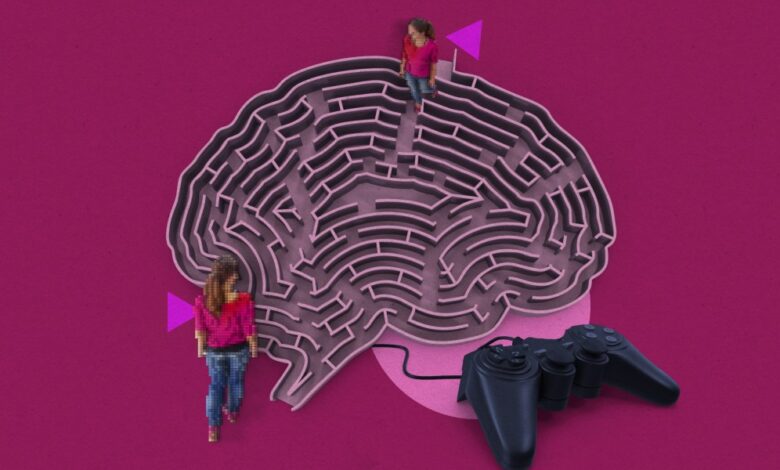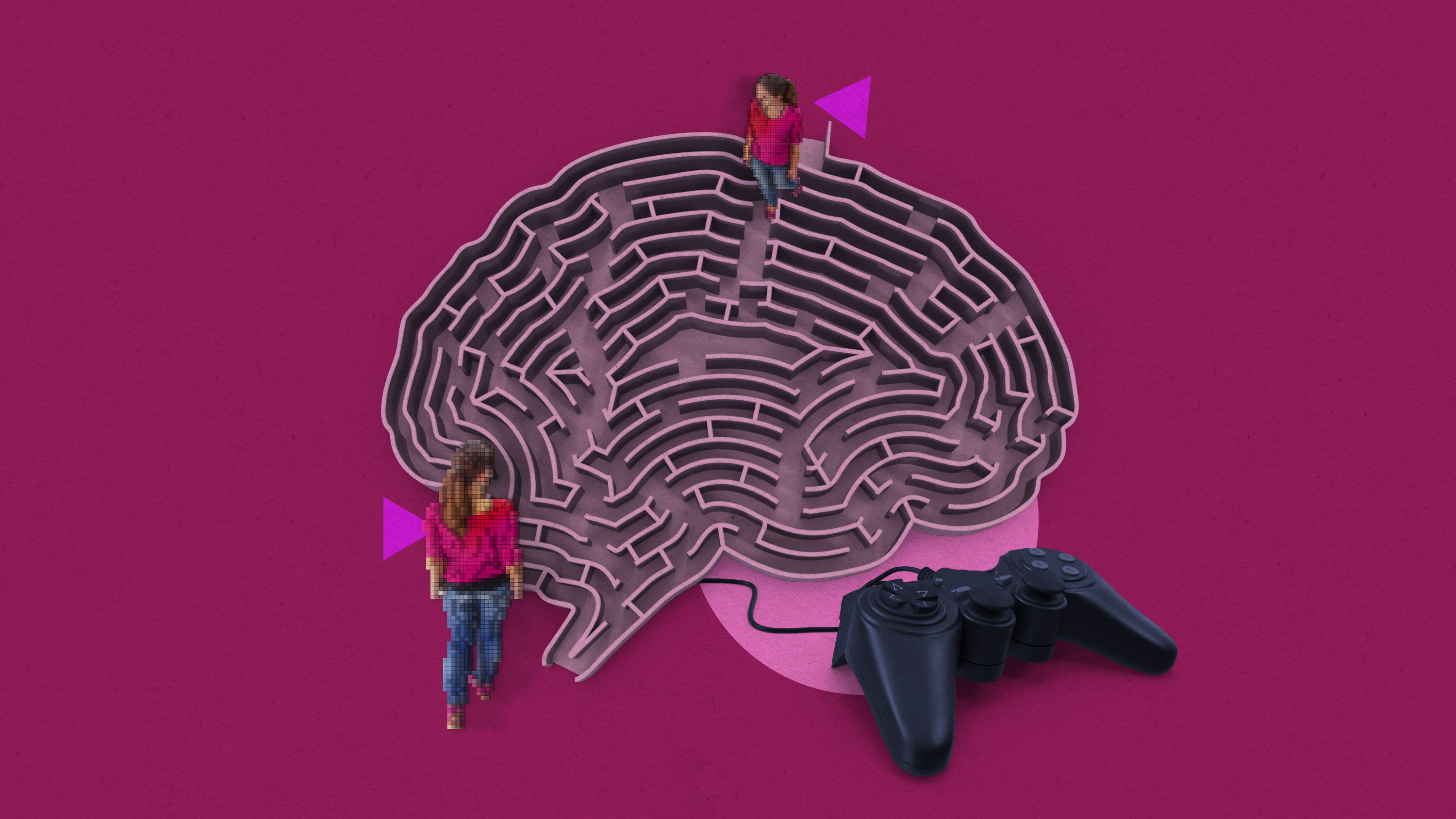The Download: AI video games’ research potential, and US government website redesigns

Plus: rump-Biden debate conspiracies are already all over the internet.

This is today’s edition of The Download, our weekday newsletter that provides a daily dose of what’s going on in the world of technology.
How AI video games can help reveal the mysteries of the human mind
Video gaming companies are applying large language models to generate new game characters with detailed backstories—characters that could engage with a player in any number of ways. Enter in a few personality traits, catchphrases, and other details, and you can create a character capable of endless unscripted, never-repeating conversations with you. (You can read our story all about that here.)
Beyond just gaming however, it’s a development that raises a tantalizing prospect: might AI video games allow neuroscientists and psychologists to probe more deeply, and unravel enduring mysteries about our brains and behavior? Our senior reporter Jessica Hamzelou decided to find out. Here’s what she learned.
This story is from The Checkup, our weekly newsletter all about biotech and health. Sign up to receive it in your inbox every Thursday.
Inside the US government’s brilliantly boring websites
Before the internet, Americans may have interacted with the federal government by stepping into grand buildings adorned with impressive stone columns and gleaming marble floors.
Today, the neoclassical architecture of those physical spaces has been (at least partially) replaced by the digital architecture of website design—HTML code, tables, forms, and buttons.
There are about 26,000 federal websites in the US. And for a long time, they were buggy or poorly designed. That all started changing in 2014, when President Obama created two new teams to help improve government tech. Read about what they’ve achieved since.
This story is from the latest issue of MIT Technology Review, which explores the theme of Play. Subscribe to read the whole thing, if you don’t already!
The must-reads
I’ve combed the internet to find you today’s most fun/important/scary/fascinating stories about technology.
1 Trump-Biden debate conspiracies are already all over the internet
And plenty of them are being pushed by Trump himself. (Wired $)
+ Election misinformation is being repeated by AI tools like ChatGPT and Copilot too. (NBC)
+ Spare a thought for pollsters. Their job is only getting harder and harder these days. (Ars Technica)
2 The voices of AI can tell us a lot
It’s new technology, but stereotypes of a compliant, endlessly empathetic female assistant are as old as it gets. (NYT $)
3 An effort is underway to encourage responsible use of AI in music
But of course, it relies on getting enough adoption—and that’s a big ask. (CNET)
+ Especially as there’s a giant legal battle underway over getting AI companies to pay to use records for training data. (MIT Technology Review)
+ Content-licensing sellers have formed the first AI dataset trade body. (Reuters $)
+ Time is the latest publisher to strike a licensing deal with OpenAI. (Axios)
4 We’re getting a better idea of how weight loss drugs work
Researchers have zeroed in on two groups of neurons in the brain that seem to regulate the feeling of fullness. (Nature)
5 Google says Gemini AI is 20% faster than ChatGPT
And execs say it can now cite its sources, which is arguably even more important. (Quartz $)
+ It’s not just Nvidia: here’s the AI stocks to watch. (WP $)
6 Amazon is investigating AI search startup Perplexity
Over whether it violated its rules by scraping its websites. (Wired $)
+ Perplexity’s CEO openly admitted to some pretty dodgy data practices when they were getting off the ground. (404 Media)
7 ISS astronauts had to take shelter after a Russian satellite disintegrated
It broke up into over 100 pieces, raising speculation it could’ve been subject to an anti-satellite missile test. (Gizmodo)
+ Why the first-ever space junk fine is such a big deal. (MIT Technology Review)
8 A lot of Gen Zs describe themselves as content creators
Passively lurking online is just not the vibe anymore. (WP $)
9 Would you clone your dog?
It’d set you back $50,000—and in a way, you have to ask what you’re really getting for that. (New Yorker $)
+ These scientists are working to extend the life span of pet dogs—and their owners. (MIT Technology Review)
10 Why the internet’s going wild for Nerds Gummy Clusters
No joke—people are getting tattoos. (Slate $)
Quote of the day
“Let’s not go overboard on this. Datacentres are, in the most extreme case, a 6% addition [in energy demand] but probably only 2% to 2.5%. The question is, will AI accelerate a more than 6% reduction? And the answer is: certainly.”
—Bill Gates claims AI will be more of a help than a hindrance in achieving climate goals, amid rising concern about its energy footprint, The Guardian reports.
The big storyInside NASA’s bid to make spacecraft as small as possible

NASA/JPL-CALTECH
October 2023
Since the 1970s, we’ve sent a lot of big things to Mars. But when NASA successfully sent twin Mars Cube One spacecraft, the size of cereal boxes, in November 2018, it was the first time we’d ever sent something so small.
Just making it this far heralded a new age in space exploration. NASA and the community of planetary science researchers caught a glimpse of a future long sought: a pathway to much more affordable space exploration using smaller, cheaper spacecraft. Read the full story.
—David W. Brown
We can still have nice things
A place for comfort, fun and distraction to brighten up your day. (Got any ideas? Drop me a line or tweet ’em at me.)
+ The Bear probably wouldn’t exist if it weren’t for the late, great Bourdain.
+ Exhausted? Remember your energy is a finite resource. Use it wisely.
+ Always late to everything? This has to be one of the funniest excuses I’ve heard yet.


